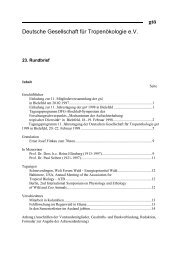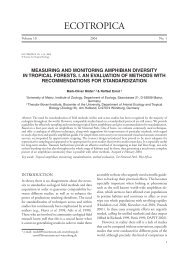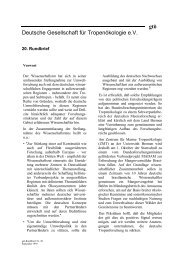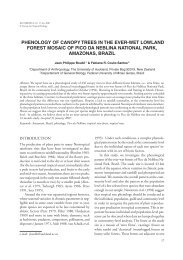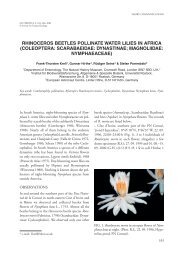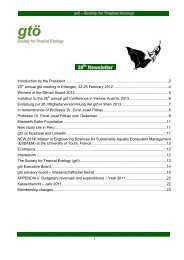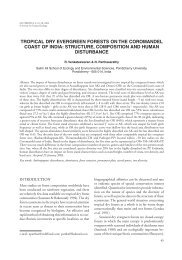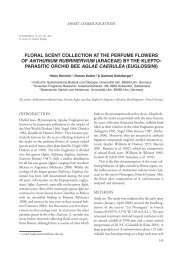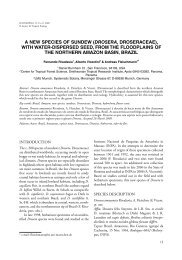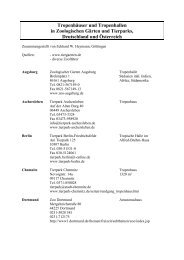Abstract booklet - gtö – Society for Tropical Ecology
Abstract booklet - gtö – Society for Tropical Ecology
Abstract booklet - gtö – Society for Tropical Ecology
You also want an ePaper? Increase the reach of your titles
YUMPU automatically turns print PDFs into web optimized ePapers that Google loves.
92 PARALLEL SESSION HALL H III | ECOLOGICAL NETWORKSPARALLEL SESSION HALL H III | ECOLOGICAL NETWORKS 93COMPLEMENTARY SPECIALIZATION OF MUTUALISTICINTERACTION NETWORKS DECREASES TOWARDS TROPICALLATITUDESMatthias Schleuning 1 , Jochen Fründ 2 , Alexandra-Maria Klein 3 , StefanAbrahamczyk 5 , Ruben Alarcón6, Matthias Albrecht 7 , Georg Andersson 8 ,Simone Bazarian 9 , Katrin Böhning-Gaese 1 , Ricardo Bommarco 10 , BoDalsgaard 11 , Matthias Dehling 1 , Ariella Gotlieb 12 , Melanie Hagen 13 ,Thomas Hickler 1 , Andrea Holzschuh2, Christopher Kaiser-Bunbury 14 ,Rebecca J Morris 19 , Brody Sandel 14 , William Sutherland 11 , Jens-ChristianSvenning 14 , Mathias Templin 1 , Teja Tscharntke 2 , Stella Watts 15 , ChristianeWeiner 16 , Michael Werner 16 , Neal Williams 17 , Camilla Winqvist 10 , CarstenDormann 18 , Nico Blüthgen 16in cooler climates. Annual precipitation did not affect network specialization.This is the first study reporting a global latitudinal and bioclimatic gradientin the structure of mutualistic interaction networks. The gradient in networkspecialization could be caused by stronger constraints against specializationin tropical ecosystems due to higher proportions of rare plant species andlonger lifespans of pollinator and frugivore species. We conclude from thesefindings that mutualistic relationships of tropical plant species exhibit a higherredundancy and thus could be less prone to disruption than those of temperateplants.WEDNESDAY 10:30 Hall H III1BiK-F Frankfurt, Frankfurt, DE, matthias.schleuning@senckenberg.de, 2 Universityof Göttingen, Göttingen, DE, 3 University of Lüneburg, Lüneburg, DE, 5 University ofZürich, Zürich, CH, 6 Cali<strong>for</strong>nia State University, Camarillo, CA, US, 7 MediterraneanInstitute <strong>for</strong> Advanced Studies, Mallorca, ES, 8 University of Lund, Lund, SE, 9 Universityof São Paulo, São Paulo, BR, 10 Swedish University of Agricultural Sciences, Uppsala,SE, 11 University of Cambridge, Cambridge, UK, 12 Tel-Aviv University, Tel Aviv, IL,13University of Bielefeld, Bielefeld, DE, 14 Aarhus University, Aarhus, DK, 15 Universityof Northampton, Northampton, UK, 16 University of Würzburg, Würzburg, DE,17University of Cali<strong>for</strong>nia, Davis, CA, US, 18 Helmholtz Centre <strong>for</strong> EnvironmentalResearch, Leipzig, DE, 19 University of Ox<strong>for</strong>d, Ox<strong>for</strong>d, UKMutualistic relationships between plants and their pollinators and seeddispersers <strong>for</strong>m the backbone of terrestrial ecosystems. While we know thatpatterns of biodiversity are strongly affected by latitudinal and bioclimaticgradients, we lack a deeper understanding of how the structure of mutualisticrelationships between plants and their mutualistic partners changes along thosegradients. In order to test whether the degree of specialization of mutualisticnetworks differs between temperate and tropical latitudes and climates,we compiled a dataset of more than 250 quantitative interaction networksof flower-visiting and frugivory interactions from more than 70 regions. Wedetermined the degree of complementary specialization (H2’) <strong>for</strong> each networkand tested whether the variation in network specialization among regionscould be explained by distance from the equator, mean annual temperature,and precipitation. Flower-visitor networks were more specialized than frugivorynetworks, while the response of both types of mutualistic interaction tolatitudinal and bioclimatic gradients was very similar. Mutualistic relationshipswere less specialized at tropical than at temperate latitudes and in warmer thanWEDNESDAY 10:30 Hall H IIIgtö<strong>Society</strong> <strong>for</strong> <strong>Tropical</strong> <strong>Ecology</strong> | Gesellschaft für Tropenökologie e.V. Status and future of tropical biodiversity | Frankfurt, 21 - 24 February 2011gtö



